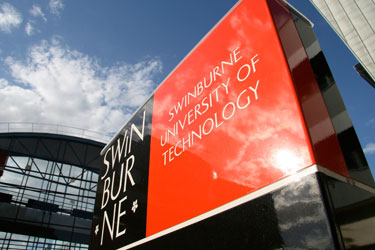“Half of the announcers I’ve ever worked in commercial radio with have had their start via Swinburne,” says Jane Nield, music director at Power FM in Ballarat.
Nield is one of the many past students to condemn Swinburne University’s decision to axe its commercial radio course. “How can our industry survive without the graduates of this course? Save it.”
Current student, Louise Singleton, has told radioinfo: “I never thought I’d go to uni, but I’m studying something I love and it’s not painful – I love it! It’s not fair that other people won’t get to do the same!”
As we reported in our Hot off the Net section last week, students have been doing some investigative reporting on statements made by the university when announcing the course closure. They are questioning whether proper processes were followed leading up to the decision to discontinue the course.
Commercial Radio Australia was not warned before the axe fell, despite contributing an annual subsidy of $20,000 to the university to support the course. CRA’s Joan Warner was surprised by the decision, and said via a spokeswoman: “Commercial Radio Australia had not been forewarned of the decision or consulted.”
CRA’s $20,000, totalled with student fees, means the course was earning $300,000 per year for the university. Despite this, Swinburne maintains it was “financially non-viable.”
In further developments, today Michael Gilding, acting Dean of the Faculty of Life and Social Sciences, told the Save the Commercial Radio Course group that the course had not been viable “at least since the formation of the Faculty eight years ago.” This contradicts earlier statements that the course was not viable since 2007.
Current student and SCRC spokesperson Michael Lamonato says Swinburne “has yet to reveal why it took on what it claims to be a costly refurbishment of the studio if the course was under such financial duress so long before 2007. Current students are concerned that Swinburne did not consult all relevant stakeholders when making its decision to cut short the heritage radio course,” says Lamonato.
Sinead Larkins, who is also studying the course this year, has told radioinfo: “Everyone should have the opportunity to do the Swinburne course as it’s the best knowledge and hands on approach to radio you’ll have. It’s a terrible decision to cut the funding, as so many people won’t have the same chance like me!”
Another student, Rob James does not think the course’s closure will affect his ability to gain employment, but is concerned about future students. “Some of us are already employed, or at least in serious discussions, with radio networks in Victoria. Two people in the course left half-way through to take up full-time employment after their industry placement in the middle of the year; which probably rang alarm bells to the powers that be at Swinburne! The course will be invaluable to all of our careers. The sad realisation is that twenty young people each year will not be entering the radio industry from next year, if the course does get tossed out.”
Lamonato says the cut “isn’t affecting us as current students particularly, but we’re all pretty upset that the course we’re all really passionate about it being thrown out by the university. And we’re upset for Jim, too – he’s but more than twenty years of effort into designing this unique course, it’s such a shame the plug’s being pulled just like that…
“We’re trying not to let our efforts to keep the course alive disrupt our studies – after all, the course itself is a load of fun for everyone there. But we are putting in a lot of time into trying to have our voices heard at the top of Swinburne’s administration. Graduation isn’t until next year – and it’ll be a pretty weird occasion if we end up being the last.”
More former students have also contributed their voice in support of the course: “My gig as producer on the top rating breakfast programme in Melbourne would never have happened if I didn’t do the Swinburne Commercial Radio course – not a chance in the world,” says Kate Stevenson, who now produces 3AW’s Ross and John.
Triple ACRA winner Steve Woods agrees: “The course is vital to the next generation of radio operators. Big Brother contestants are not the solution.”

